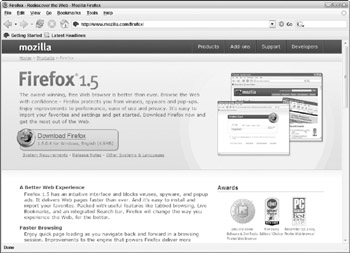Using Other Web Browsers
Prior to the release of Windows XP Service Pack 2, a number of security vulnerabilities led security and media organizations to recommend that users stop using Internet Explorer and switch to a safer web browser. Although there's no denying that many of the more recent browser-related exploits specifically targeted Internet Explorer (especially as a result of its scripting-, Java-, and ActiveX-related capabilities), there is no rock-solid guarantee that malware developers are not targeting other web browsers, or that they won't do so in the future.
Regardless, increasing numbers of users are switching to alternative web browsers every day. Although IE7 is still the obvious choice for most users (because it is already included with Windows Vista), a number of third-party web browsers exist. Users who make the switch to these browsers typically sacrifice little in the way of browser functionality, and are often zealous in supporting them - as an alternative to what they perceive as the dangers of Internet Explorer, regardless of how safe (or unsafe) it may actually be when properly secured.
Some of the most popular alternative web browser programs include:
-
Firefox. This open-source web browser, shown in Figure 5-18, has firmly entrenched itself as a viable alternative to Microsoft Internet Explorer and has a rapidly expanding user base. Some of this browser's key features include tabbed browsing (where a single browser window can be used to open multiple web pages, each on its own tab), integrated Google search facilities, and support for live bookmarks and RSS feeds. Firefox is available as a free download from http://www.getfirefox.com.
-
Netscape. Once the undisputed king of web browsers, Netscape's popularity waned as Internet Explorer's feature set advanced and surpassed it years ago. The latest versions of Netscape have vastly improved, and users are once again returning to it as an alternative to Internet Explorer. You can download the latest version of the Netscape web browser from http://www.netscape.com.
-
Opera. Opera is another popular alternative browser that includes features like tabbed browsing, integrated search and password management tools, and advanced customization features. You can download Opera, billed as "The Fastest Web Browser on Earth," from http://www.opera.com.

Figure 5-18: The Firefox web browser is a popular alternative to Internet Explorer.
Regardless of whether you intend to switch from Internet Explorer to an alternative browser permanently, it's well worth your time to download at least one of these programs to explore them further. Using a different web browser does entail a slight adjustment period, but some of their advanced features and capabilities make them well worth taking for a test drive.
| Caution | No program or web browser will ever offer complete or absolute security. Although Internet Explorer certainly receives it fair share of bad press, vulnerabilities have been discovered in other web browser programs. To review both old and new security issues discovered in Internet Explorer and competing products in more detail, visit the Secunia Advisories web site at http://www.secunia.com/advisories. |
EAN: 2147483647
Pages: 135